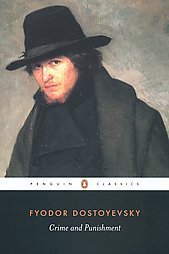Title:
A Psychological Masterpiece: "Crime and Punishment" by Fyodor Dostoevsky
Fyodor Dostoevsky's "Crime and Punishment" is a tour de force of psychological depth, moral complexity, and profound exploration of the human psyche. First published in 1866, this Russian classic remains a cornerstone of world literature, captivating readers with its intricate narrative, philosophical underpinnings, and a relentless examination of the consequences of human actions.
At the heart of the novel is Rodion Raskolnikov, a destitute and intellectually gifted student living in St. Petersburg. Driven by a twisted ideology that justifies the murder of a pawnbroker as a means to achieve a greater good, Raskolnikov commits the crime, setting in motion a series of events that unravel the intricacies of guilt, redemption, and the moral fabric of society.
Dostoevsky's narrative brilliance lies in his profound understanding of the human psyche. Raskolnikov's internal struggles, depicted with visceral intensity, expose the depths of human consciousness and the moral torment that follows the commission of a heinous act. The novel delves into the darkest recesses of the human soul, forcing readers to confront uncomfortable truths about morality and the consequences of moral transgressions.
The supporting cast of characters, including the enigmatic Sonia, the morally righteous Porfiry Petrovich, and the insidious Svidrigailov, contributes to the novel's complexity. Each character serves as a reflection of different facets of human nature, adding layers of nuance to the exploration of morality, sin, and redemption.
The novel's setting in 19th-century St. Petersburg becomes a character in itself. Dostoevsky masterfully captures the atmospheric decay and societal unrest of the time, mirroring the inner turmoil of Raskolnikov and the moral decay that permeates the world he inhabits.
"Crime and Punishment" is not merely a psychological thriller but also a philosophical exploration of morality and the nature of good and evil. Dostoevsky grapples with existential questions, presenting conflicting ideologies through the characters of Raskolnikov and Sonia and challenging readers to confront their own beliefs about morality and justice.
The novel's narrative structure, with its shifting perspectives and internal monologues, adds to its complexity. Dostoevsky's ability to seamlessly blend psychological depth with philosophical inquiry showcases his literary genius. The gripping plot, coupled with the author's profound insights into the human condition, makes "Crime and Punishment" a timeless and resonant work.
In conclusion, "Crime and Punishment" stands as a literary triumph that transcends its time and cultural context. Fyodor Dostoevsky's exploration of morality, guilt, and redemption, coupled with his deep understanding of the human psyche, renders this novel a profound and enduring masterpiece that continues to captivate and challenge readers across the ages.

Comments
Post a Comment